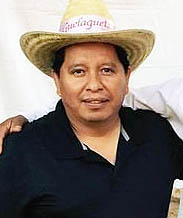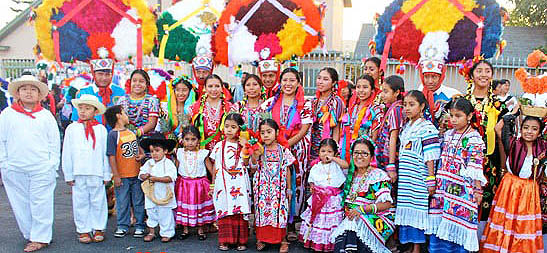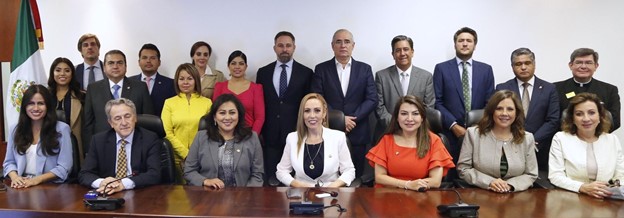|
|
|
|
The weekly newsletter of the México Solidarity Project |
|
|
|
September 15, 2021/ This week's issue/ Meizhu Lui, for the editorial team |
|
|
Tres por Uno: When Equal Becomes Unequal |
|
People who migrate to the United States leave their family, friends, and neighbors in the little villages where they grew up. But they don’t really leave them behind. They take them along in their hearts. They’re leaving, after all, to make enough money to send home not just for their parents and siblings, but for improvements to the villages themselves.
Back in 2002, PAN President Vicente Fox took note of this desire to contribute and came up with a clever way to maximize remittances — and gain control over them to PAN’s advantage. His Tres por Uno program, also known as “3 x 1,” invited emigrants to propose village improvement projects, raise a third of the money, and then — if that money gets raised and the project gets accepted — the federal and state government would each put in another third. To many Mexicans in the US, this seemed like a wonderful opportunity to multiply their dollars. The program raised over $35 million a year between 2012 and 2015.
But the PAN and PRI governments, while matching the funds, didn’t come close to matching the generosity and good intentions of Mexicanos in the US. Tres por Uno did not deliver rational community development plans based on careful assessments of what projects were needed where. Instead, in effect, the program privatized public works. Only villages that had US-based clubs fundraising for them ended up getting support. And the clubs, once they sent in their money, had no say on project management, and that left the pols free to line their pals’ pockets. The program also helped the PAN politically. The clubs became dependent on PAN governors and curried their favor to get their projects approved.
Even given all these realities, as Valentin Ramirez discusses in our interview this week, convincing some clubs that the PAN and its Tres por Uno haven’t had their best interests in mind, can be difficult. Club leaders can see that their dollars did produce some improvements, and they take pride in that.
Today’s PAN, like the US Republican Party, is careening ever further to the right. Last week, party leaders even expressed open admiration for Spanish dictator Franco’s fascist politics. The PAN promises only greater inequality for México. If Mexicanos want to improve their beloved hometowns, their concern must not stop at the village line. They can work to ensure prosperity for all Mexicans and reject the PAN agenda, so no one will be left behind. |
|
|
Valentin Ramirez left México in his teens after the maquila he worked for shut down without telling the workers — or paying their last wages. Ramirez has been working the past 30 years in San Diego’s hotel industry, but spending most of his energy on organizing other Mexicanos. His goal: to sharpen the political consciousness of his fellow migrants.
What changes have you seen since coming to San Diego?
The number of Mexicans has skyrocketed, especially from Oaxaca. A million people have left Oaxaca over 30 years. Today, here in San Diego, we have more tortillas sold than hamburgers. Some schools have only Mexican children. |
|
|
Many of the Mexicanos in San Diego come from small villages, and they often form organizations to help people back home, is that right?
I come from a small town myself, of about 800 people. Now that town has only about 400 people left. Mexicanos in the US don’t just help their families, they help their villages. I started a network of clubs named for the small places the Mexicanos in the US come from. These clubs raise money for improving their hometowns. |
|
The clubs also put on fiestas and cultural events to bring the people together and to fundraise. They celebrate, for example, Oaxaca’s Guelaguetza festival — which I support — every year in San Diego, Los Angeles, and other places. |
|
|
How do these clubs relate to the Mexican government?
PAN and PRI had a “Tres Por Uno” — 3 x 1 — program. If people in the US knew their home village needed something, they could apply. The US Mexicanos, the federal government, and the state government would each put in a third of the money needed.
People in the US had to raise the money first, and going through the process would take about two years. Say the project cost $3,000 and people in the US raised $1,000. If the project’s cost rose over those two years to $3,300, the community would need to raise another $100 before they could get the match. If they didn’t raise the money, nothing would happen. If three miles of road needed repair and they only raised enough for one mile, not even one mile would be repaired, all or nothing.
Corruption made things worse. If a repair did get made, the contract often went to a friend of the governor’s, at inflated prices followed by poor workmanship. States and municipalities headed by PAN turned out to be more likely to participate in the program, and the PAN grabbed more electoral support by funding more projects.
To me, Tres Por Uno was exploiting citizens working abroad. Yes, those of us Mexicanos who live in the US want to contribute and we will always send remittances. But a development plan based on remittances doesn’t solve México’s economic problems. The AMLO government canceled Tres por Uno. That made some clubs mad, because they had become used to that old system.
But without funds from Mexicans in the US, doesn’t that leave the villages worse off than before?
No. Before, if a school had been built with a club’s support, every person in the village had to work six days a year to maintain it. I say to the club leaders: “You don’t see everyone in the US having to do the work themselves to keep the school buildings in good repair!” Now the Morena government is paying for maintenance.
In a Morena program for farmers, the government will “lend” five cows. When the cows reproduce, the farmer gives five cows back to the government and those can then be lent to someone else. Another Morena program, the Sembrando Vida — Sowing Life — project, helps poor rural communities restore the soil and grow healthy foods.
Higher old-age benefits in México, meanwhile, now have more Mexicanos returning to México to retire. With that has come a decrease in the number of clubs, and some of the people I talk to don’t like that. But with an improving economy, I like to point out, we don’t see as much need. The decline in clubs shows that things are improving.
What are you hoping your network of clubs can do?
We share ideas and information via the network. People in our hometowns sometimes don’t know about the new social benefit programs or how to apply. Instead of just fundraising, we can give them that information and help fill out the forms.
Most of the people in the United States active in the clubs don’t support Morena, partly because they get their news from traditional conservative Mexican TV. As they get better information about what’s happening, I hope to create more unity and support for the Fourth Transformation among those Mexicanos working hard in the US to support themselves, their families, and their villages. |
|
|
|
México’s conservative PAN party earlier this month took a giant step to the right, joining with Spain’s fascistic Vox party in the signing of a new transatlantic pact. La Jornada, the Mexican progressive daily, had this editorial reaction. |
|
The Madrid Charter: The PAN Party Exposed |
|
On September 2, 15 senators of the National Action Party (PAN) met with the leader of the Spanish ultra-right Vox party, Santiago Abascal. During the meeting, which took place in the offices of the PAN’s parliamentary caucus, the legislators signed the Madrid Charter, a document promoted by the fascist party to bring together political and social leaders in the fight against the advance of communism in the Iberosphere. According to the Charter, part of the region is held hostage by totalitarian regimes of communist inspiration, supported by drug trafficking and third countries.
More than half of PAN’s senators signed in support of a party that (among other things) advocates for the criminal prosecution of all political dissidents in matters of national identity; the suppression of the autonomous communities, the annulment of regional judicial in open violation of local sovereignties; the immediate expulsion of all undocumented immigrants, even if they are minors; religious intolerance and the protection of Europe’s Christian identity; the cancellation of the rights won by the LGBT community, and opposition to women’s rights (including decriminalization of abortion and acting to stop violence against women).
The signing of the Madrid Charter not only shows the retrograde, authoritarian, and submissive nature of a good part of the Mexican opposition, it also reveals the inability of the right-wing forces in the Spanish-speaking world on both sides of the Atlantic to articulate ideological and political programs in keeping with pulse of contemporary society. By rallying to fight the non-existent danger of the advance of communism in what they hispanocentrically call the Iberosphere, Vox and the PAN show such an absolute disconnection from reality that they take a bipolar approach to the world that died three decades ago as the axis of their political activity. |
|
|
Recent news reports and commentaries, from progressive and mainstream media,
Natalie Kitroeff and Oscar Lopez, Abortion Is No Longer a Crime in Mexico. But Most Women Still Can’t Get One, New York Times. The Supreme Court’s decision set a legal precedent for the nation. But applying it to all of Mexico’s states will be a long path, and women are still facing prosecution.
“Inconstitucional, proteger vida desde concepción,” El Universal. La Suprema Corte de Justicia de la Nación ha declarado inconstitucional la protección de la vida desde el momento de la concepción al considerar que atenta contra los derechos reproductivos de las mujeres.
Carlos Illades, El anticomunismo al ataque, Jacobin. La extrema derecha mexicana se reunió recientemente con el español Santiago Abascal, de VOX, para formar un «frente anticomunista» internacional.
Katie Canales, Photos of a new, sprawling Amazon warehouse in Mexico surrounded by deteriorating shacks have gone viral as the tech giant continues to expand its footprint internationally, Business Insider. The company began its push into the Mexican market in 2015 to compete with Walmart in e-commerce.
Manuel Pérez Rocha Loyo, Oportunidades para desmantelar el sistema de demandas inversionista-Estado, La Jornada. Es menester para la 4T eliminar derechos corporativos entregados en el T-MEC.
Natalie Kitroeff and Oscar Lopez, México’s Supreme Court Greenlit Abortion. Will Doctors and Nurses Listen? New York Times. The high court is considering whether to require public hospitals to have medical professionals on staff who are willing to perform abortions or else transfer patients to facilities that do. |
|
|
The Mexico Solidarity Project brings together activists from various socialist and left organizations and individuals committed to worker and global justice who see the 2018 election of Andrés Manuel López Obrador as president of México as a watershed moment. AMLO and his progressive Morena party aim to end generations of corruption, impoverishment, and subservience to US interests. Our Project supports not just Morena, but all Mexicans struggling for basic rights, and opposes US efforts to undermine organizing and México’s national sovereignty.
Editorial committee: Meizhu Lui, Bruce Hobson, Bill Gallegos, Sam Pizzigati. We welcome your suggestions and feedback. Interested in getting involved? Drop us an email! |
|
|
|
Web page and application support for the México Solidarity Project from NOVA Web Development, a democratically run, worker-owned and operated cooperative focused on developing free software tools for progressive organizations. |








